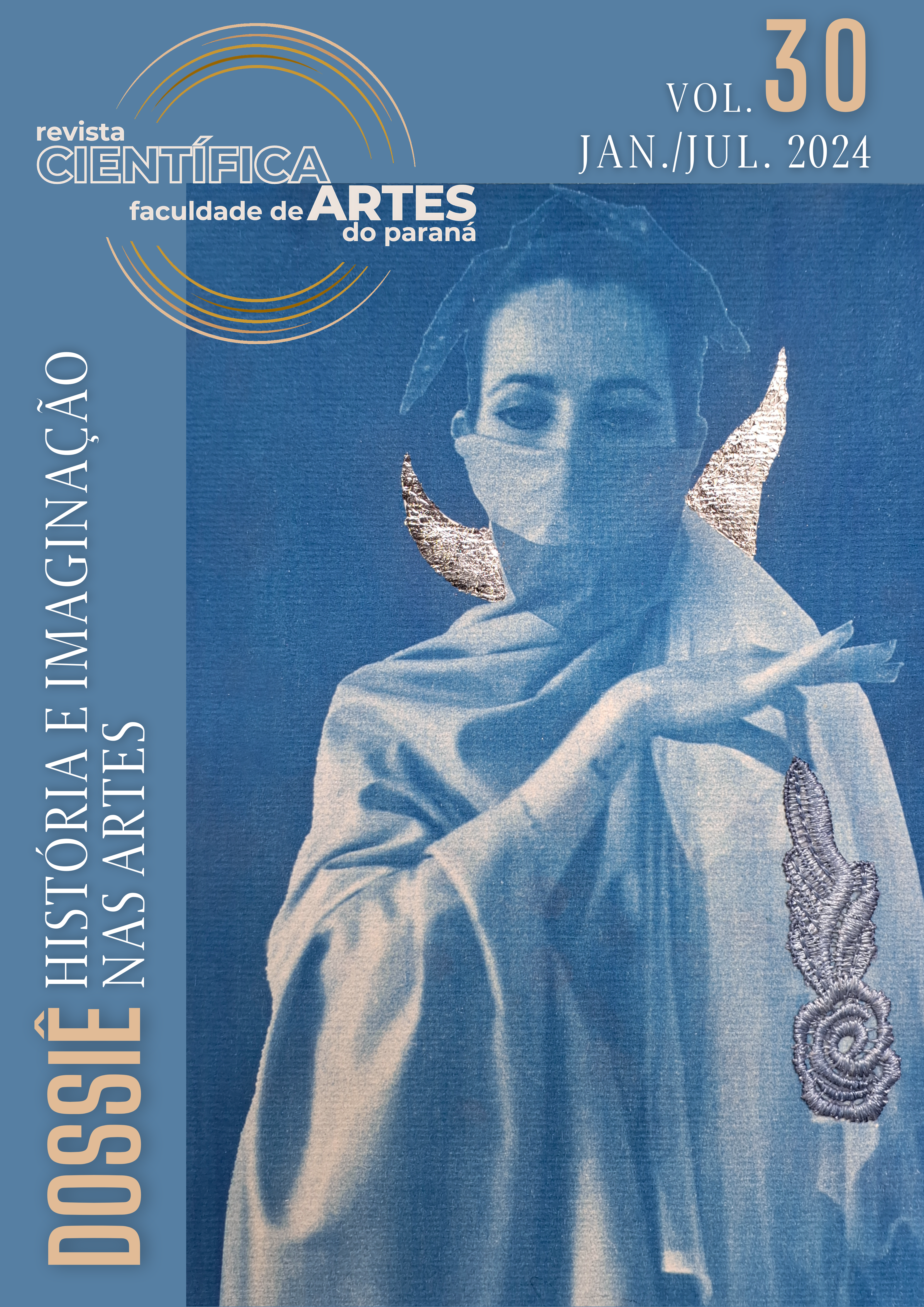“Adjetivo Feminino”
relações entre arte, gênero e palavras que agem
DOI:
https://doi.org/10.33871/19805071.2024.30.1.8701Palavras-chave:
arte e palavra, feminismos, fala performativa, mulher e esfera pública, mulheres na arteResumo
Este texto apresenta o livro de artista “Adjetivo Feminino: dicionário de experiências”, um trabalho participativo que recebeu relatos de 41 mulheres sobre adjetivos usados para caracterizá-las que as marcaram ao longo da vida, ligados ao seu gênero, a partir dos quais foram criados 59 verbetes. Através da análise desse trabalho, busca-se compreender em que medida as mulheres são vistas como sujeitas, atualmente, face a uma história de objetificação e domesticidade, para que suas falas possam ser reconhecidas e narrativas plurais sobre esse gênero possam ser incorporadas na sociedade. Com a articulação desenvolvida por Judith Butler (2003, 2021) entre a teoria dos atos de fala de John Austin (1990) e o conceito de performatividade de gênero, investigamos os efeitos da linguagem nas experiências formadoras da categoria “mulher”, bem como as possibilidades de deslocamento ou ressignificação dos discursos normativos de gênero através da criação de contranarrativas poéticas. Nesse sentido, compreende-se a produção artística de mulheres também como potência de transformação de enunciados patriarcais, conforme defende Griselda Pollock (2007), o que demonstra a relevância da ainda necessária discussão sobre a presença de mulheres na arte.
Downloads
Referências
AUSTIN, John Langshaw. Quando dizer é fazer: palavras e ação. Porto Alegre: Artes Médicas, 1990.
BEAUVOIR, Simone de. O segundo sexo. São Paulo: Difusão Europeia do Livro, 1970.
BOCCHINI, Bruno. Mulheres têm rendimento 21% inferior ao dos homens, mostra pesquisa. Agência Brasil, 06 mar. 2023. Disponível em: https://agenciabrasil.ebc.com.br/economia/noticia/2023-03/mulheres-tem-rendimento-21-inferior-ao-dos-homens-mostra-pesquisa. Acesso em: 07 dez. 2023.
BUTLER, Judith. Problemas de gênero: feminismo e a subversão da identidade. Rio de Janeiro: Civilização Brasileira, 2003.
BUTLER, Judith. Discurso de ódio: uma política do performativo. São Paulo: Editora Unesp Digital, 2021.
CHADWICK, Whitney. Mujer, arte y sociedad, Barcelona: Ediciones Destino, 1992.
GIUNTA, Andrea. Feminismo y arte latinoamericano. Ciudad Autónoma de Buenos Aires: Siglo XXI, Editores Argentina, 2021.
HIRATA, Helena, et al. (orgs.). Dicionário crítico do feminismo. São Paulo: Editora UNESP, 2009.
HOOKS, Bell. Talking Back: thinking feminist, talking black. Boston: South End Press, 1989.
IBGE. Diretoria de Pesquisas, Coordenação de Trabalho e Rendimento. Pesquisa Nacional por Amostra de Domicílios Contínua 2022. Rio de Janeiro: IBGE, 2023. Disponível em: https://biblioteca.ibge.gov.br/index.php/biblioteca-catalogo?view=detalhes&id=2102020. Acesso em: 07 dez. 2023.
KILOMBA, Grada. Memórias da plantação: episódios de racismo cotidiano. Rio de Janeiro: Cobogó, 2019.
NOCHLIN, Linda. Por que não houve grandes mulheres artistas? São Paulo: Edições Aurora, 2016.
ONU. Chefe da ONU alerta para aumento da violência doméstica em meio à pandemia do coronavírus. 20 abr. 2020. Disponível em: https://brasil.un.org/pt-br/85450-chefe-da-onu-alerta-para-aumento-da-violencia-domestica-em-meio-pandemia-do-coronavirus. Acesso em: 30 mar. 2021.
POLLOCK, Griselda. Visión, voz y poder: historias feministas del arte y marxismo. In: REIMAN, Karen Cordero; SÁENZ, Inda (orgs.). Crítica Feminista en la teoría e Historia del arte. México: Universidad Iberoamericana, 2007.
RACHEL, Denise Pereira. As mulheres andam mal: das aulas erráticas às aulas vadias na emergência dos mapas do medo. Rascunhos, Uberlândia, MG, v.5, n.3, p. 36-59, dez. 2018. Disponível em: https://seer.ufu.br/index.php/rascunhos/article/view/43163/24962. Acesso em: 19 jul. 2022.
SIMIONI, Ana Paula Cavalcante. O corpo inacessível: as mulheres e o ensino artístico nas academias do século XIX. ArtCultura, Uberlândia, v. 9, n. 14, p. 83-97, jan.-jun. 2007.
Downloads
Publicado
Como Citar
Edição
Seção
Licença
Os autores detém os direitos autorais, ao licenciar sua produção na RevistaCientífica/FAP, que está licenciada sob uma licença Creative Commons. Ao enviar o artigo, e mediante o aceite, o autor cede seus direitos autorais para a publicação na referida revista.
Os leitores podem transferir, imprimir e utilizar os artigos publicados na revista, desde que haja sempre menção explícita ao(s) autor (es) e à Revista Científica/FAP não sendo permitida qualquer alteração no trabalho original. Ao submeter um artigo à Revista Científica/FAP e após seu aceite para publicação os autores permitem, sem remuneração, passar os seguintes direitos à Revista: os direitos de primeira edição e a autorização para que a equipe editorial repasse, conforme seu julgamento, esse artigo e seus metadados aos serviços de indexação e referência.


